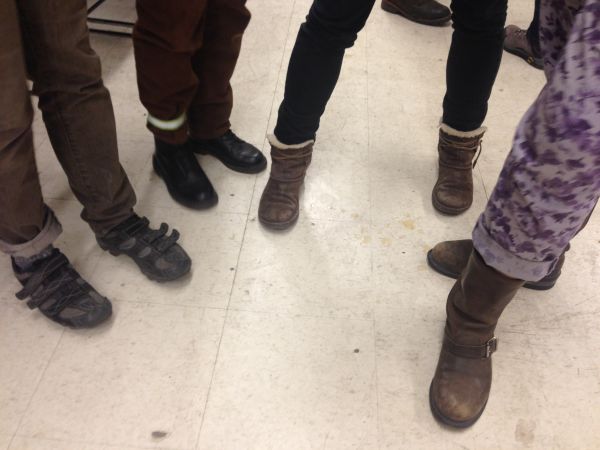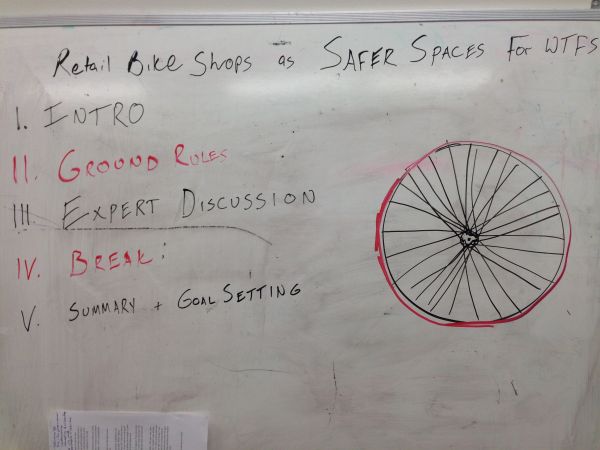Participating in a Grease Rag open shop is about safer, inclusive and welcoming spaces for WTFs who want to spend some time learning and wrenching on their bike. At shop nights and Grease Rag events, WTFs have the opportunity to surround themselves in a friendly atmosphere and shine in bike love and know-how. But what about the cis-dominated bike culture outside of Grease Rag that WTFs experience in bike shops and at bike events around the Twin Cities? It’s not always so friendly and shiny for us out there.
Grease Rag host shops asked Grease Rag to help them create better spaces for WTFs.
While these spaces cannot guarantee safety, they can help us to feel welcome, included, and safe. This is not about “How do we get WTFs to spend money in shops,” but more about, “How do we support WTFs so they feel welcome in our space?”
Without even really thinking about it, I’ve been avoiding bike shops for years. I’ve come to expect a shop full of exclusive, spandex-clad, know-it-alls who are waiting to talk my ear off about a product that I don’t even care about and probably suggest an over-priced hot-pink jacket that was precisely NOT what I wanted. It was probably just a few bad experiences that have stuck with me, but they leave lasting impressions. I was excited to sit down with shop employees/owners who recognize this problem. I’m ready for a change. – Holly
Where else to turn but towards the experts?!
Shop owners who host Grease Rag open shops asked Grease Rag to help them discover ways that would help them bridge the gap between a cis-normative culture, and the safer spaces Grease Rag is working towards. Brian Fanelli (Recovery Bikes) and Low (Grease Rag World Headquarters) teamed up to host a “listening session,” where WTFs would have center stage in describing their experiences and suggesting ways that shops could help them to feel safer and more welcome.
I, being a trans who defines myself as she/her pronouns, was happy to see that Laura had set up this meeting of bike shops and women, trans, and femmes. The format with Laura and Brian was so professional and warm. The desire of the bike shops to have a warm, safe and a nonjudgeable shop was so great to see. I was also happy to see women state what they wanted and expected. After 5 decades of being scared, its great to have a nice safe place. Now only if other places can be the same. – Tina
This discussion took place on Sunday, March 22nd, at Recovery Bikes (thanks for coffee donations from Aki’s Bread Haus and delicious treats purchased from Durango Panaderia). Recovery, SPOKES, Hub, Venture North and Cycles for Change were all present and represented for this discussion. Twenty WTFs answered the call from Grease Rag. Not enough chairs. Not. Enough. Chairs.

So, what’s a listening session?
Because talking about sexism and transphobia is personal, Grease Rag knew it was important to limit power dynamics and intimidation in this conversation. So, Low and Brian led a facilitated discussion format that allowed WTFs to share without being challenged, interrupted, or confronted with hostility. The focus of this discussion was on the experiences and expertise of WTFs. Shop representatives listened.
This is the outline of that facilitated discussion:
- Introduction of facilitators and building ground rules for communication
- Shop representatives introduced themselves and shared one thing they do to serve WTF customers, and one thing they do for WTF employees
- A “go around”: each WTF participant introduced themselves and shared one thing that they are excellent at
- To guide the WTF sharing portion, questions from submitted by shop owners were asked. These questions were submitted prior to the event. During this portion of the event, shops did a lot of listening and gave priority to WTF Expert voices. Note cards were available for shop representatives to write their clarifying questions.
Detailed notes about this discussion format and this meeting’s content can be found here.

What shops are already doing
It was important to recognize that our partner bike shops/organizations who are participating in the sustainability of Grease Rag open shops are in some cases, already taking steps to help foster safer spaces for WTFs. During the introduction of shop representatives, the following way that shops help WTF customers/employees feel safer were shared: making all-gender, single occupancy bathrooms available; informal training about gender/sensitivity/equity/cis-male-awareness; asking employees and customers what their prefered gender pronoun is; asking the same questions of all customers (not assuming ability, interests, knowledge, etc.) without shame or condescension; and hiring WTF staff (acknowledging that is is much easier to teach someone about bikes than it is to teach them how to be a respectful person).
Moderated Listening Circle/Discussion
As it turns out, 20 or so WTFs have plenty to share about their experiences. During the discussion time, the group was able to cover four question sets:
- How do we have the conversation about preferred gender pronouns in spaces, especially where people are not familiar with the need to be intentional to think about pronouns or trans* inclusion? Why are preferred gender pronouns so important.
- What do we do when we make a mistake? Are we expected to be perfect?
- How do we create spaces where we can be called out on our mistakes?
- We have to talk with women about their bodies with regard to bike fitting, etc. Is there a best way to talk about this?
While this is not a summary of all that was described, explained, and suggested in that discussion, it is the author’s notes on themes that came from answers to shop representative’s questions:
- Respect my represented and prefered gender identity by not making assumptions about what that might be. Respectfully ask me what I prefer, or introduce yourself with your prefered gender pronouns so that I understand that you are not reinforcing gender binaries.
- Saying something “wrong” is okay if you remain friendly, own it, and move on by promising me that you will do it differently next time. Remember the power-dynamic in our relationship, give me space to correct you.
- Start our interacting by not assuming anything about why I’m in the store, what I know about bikes, or what I’m interested in. Remembering power-dynamics, ask “what brings you in today,” rather than “how can I help you.” Have a friendly and fair conversation with me!
- When talking about products, don’t assume that all women fit the “women-specific” merchandise in body or mind. Ask before you touch, talk about, or examine my body.
- Shops and customers expressed frustration about the quality, limited variety, marketing of women-specific products.
Full notes from this discussion are captured here.
There were two things I really loved about this discussion. First, I finally got to share the “bike shop dude offers unsolicited advice with me that was both condescending and gender-blind idiocy” with some bike shop dudes. I’ve been carrying that resentment around as a grudge for a decade, and maybe I can now let it go. Second, while I hope some of the stories got through to the crew from the shops, even if it didn’t it got through to me. I learned new things about what I can do to be more welcoming and respectful in my own life. – Janne
Implementation and accountability
Following the discussion, shop owners were asked to share steps they would take, as a result of this discussion, to make their shop safer for WTF customers and employees. A list of actionable goals were noted, and some suggested another event to continue the discussion. Shops should know that ‘secret shoppers’ may check in on the progress of these goals, so they were encouraged to share what they learned and promised with their colleagues.
We closed the event with each participant sharing one word that described how they felt. The most common word? “Incomplete”.
